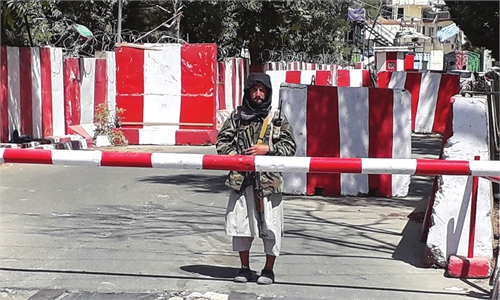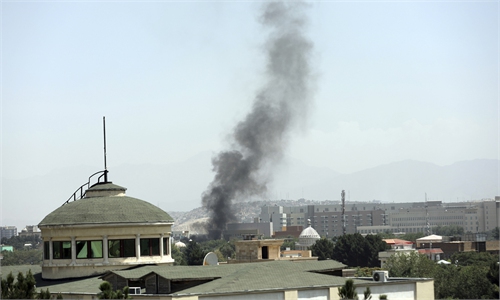US’ complete collapse in 20-year Afghan war, a page of humiliation and proof of US failure in stretching arms to control, change others
Draped in shame
After fighting the "longest war" in its history, the US is now witnessing a complete failure in Afghanistan, a country also known as "the Graveyard of Empires," which analysts have said is a "page of shame" that the US has written for itself.
On Sunday night, the Taliban forces entered the capital of Kabul and took control of the presidential palace while Afghan President, Mohammad Ashraf Ghani, left the country. This came 10 days after the Taliban launched a full-scale military offensive and less than a month before the deadline that US President Joe Biden had set for all US troops to withdraw from Afghanistan.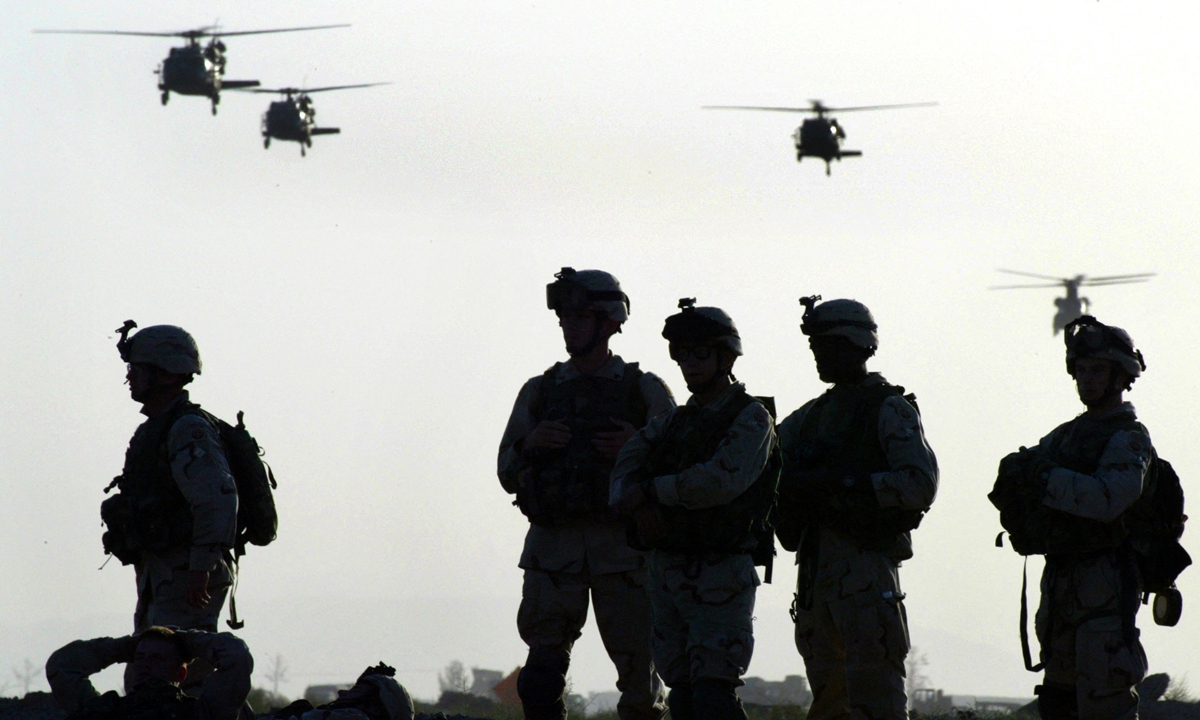
It's reported that the Taliban have assured that all the diplomatic missions and foreign citizens in Kabul will face no danger. Meanwhile, the US has reportedly completed the evacuation of its embassy in Afghanistan.
Photos of an American helicopter evacuating people on the roof of US Embassy in Kabul was compared with a photo showing evacuees boarding a helicopter over a building in Saigon (Ho Chi Minh city) when the US was defeated in Vietnam in 1975 and the photos went viral on the social media. "This is another Saigon time for the US," some netizens said. Some said this is the "fall of Kabul" just as the "fall of Saigon" which is a shame in US history.
US Secretary of State Antony Blinken tried to defend the evacuation and told media that "Remember, this is not Saigon."
While Blinken is still trying to defend Biden's decision of withdrawing troops, for Afghans, what the US has left is a total mess drawn out over the past two decades.
Over the past 20 years, Afghanistan has been stuck in misery. The war has not only killed at least 100,000 civilians but has also left the country with difficulties in rebuilding its economy and political system.
Hujjatullah Zia, a Kabul-based columnist for Daily Outlook Afghanistan, told the Global Times on Monday that this is the defeat of the US and is a "repeat" of Vietnam for the US.
Zia is currently in Kabul and feels "a bit worried." He said he was surprised to see how quickly the Taliban took over the whole country. "[Currently in Kabul], it seems that people started a normal life but still fear is in the air," he said.
Li Weijian, vice chairman of the Chinese Association for Middle East Studies, told the Global Times on Monday that what the US gained in Afghanistan is an important lesson. The US should realize that its plan to wantonly create regimes did not suit local conditions and ultimately did not work.
"Afghanistan is just further proof that the US is retreating its tentacle in the world. Stretching its arms everywhere in the world is not sustainable. Using their own mind to control, educate, and change others could only fail," he said.
Analysts pointed out that the US has suffered five major blows: damage to American strength; to its reputation; to US diplomacy; to American democracy; and to US arrogance.
A mess for Afghanistan
On September 11, 2001, the twin tower terror attack orchestrated by the Al-Qaeda shook the US. In a bid to destroy Al-Qaeda and under the guise of bolstering local and global security, the US initiated the war in Afghanistan on October 7, 2001.
The US quickly occupied Kabul and dismantled the Taliban regime. But it did not stop its operation. Instead, it increased its troop presence in Afghanistan in 2010. At its peak, there were 100,000 American troops garrisoned in Afghanistan.
On April 14, Biden announced the withdrawal of all American troops from Afghanistan before September 11, along with NATO troops. He said that the US has completed the goal of counter-terrorism.
However, both Afghan and Chinese experts reached by the Global Times noted that the "war on terrorism" that the US declared is a failure.
Back in the US, many people also saw it as a lost war. More than 20,000 US soldiers and officers were wounded in Afghanistan, and 2,300 were killed. More than $2.26 trillion was spent, according to media reports.
But for Afghan people, the price is even heavier. Zhu Yongbiao from the Center for Afghanistan Studies in Lanzhou University told the Global Times in a previous interview that about half of all civilian casualties in Afghanistan in the past 20 years were directly related to the US troops. The war also led to 2 million people becoming refugees and caused huge losses to property.
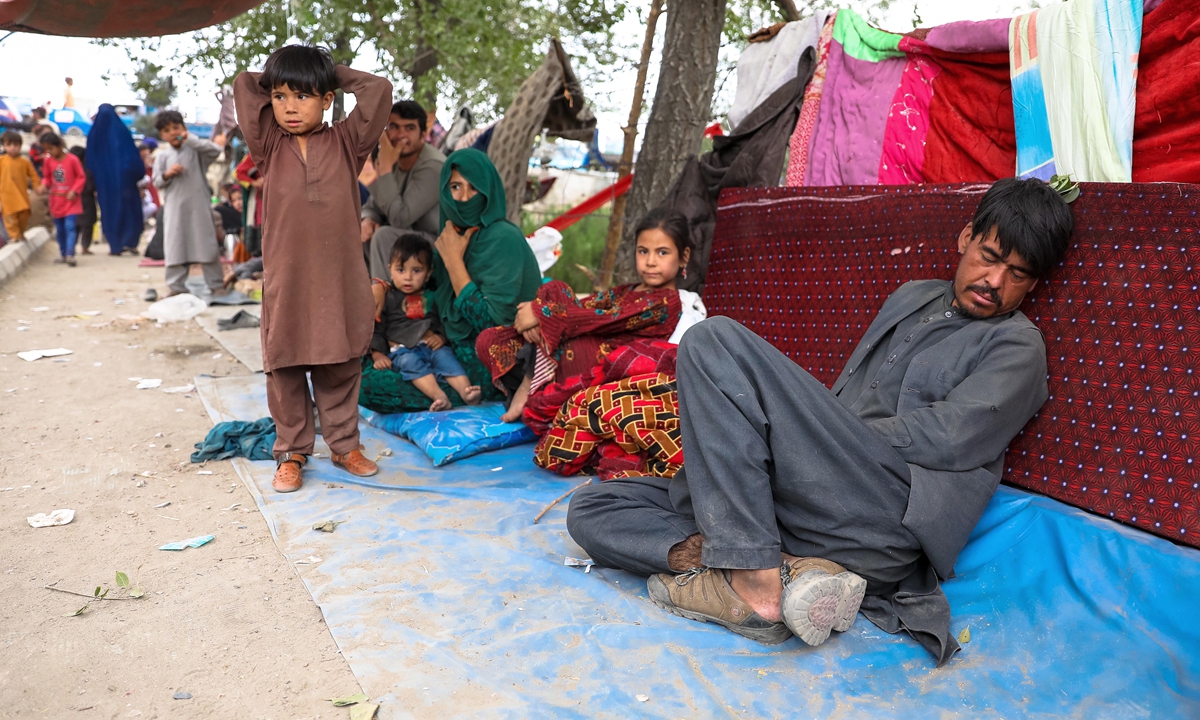
Economically, Afghanistan is still suffering from poverty and economic decline, Zia said.
Analysts pointed out that while the US once promised to rebuild Afghanistan, its promise was substantially frustrated.
Zhao Minghao, a senior fellow at the Institute of International Studies for American Studies at Fudan University and a researcher at the Center for International Security and Strategy at Tsinghua University (CISS), analyzed why US "nation building" plan in Afghanistan failed.
Based on the investigation of the relevant policies and their implementation during the Bush and Obama administrations respectively, it can be concluded that the "nation-building" carried out by the US in Afghanistan lacks feasible goals and coherent, clear strategies. Many policies are contradictory, resource channeling is incredibly insufficient, and there are many problems in policy implementation, and institutional coordination, Zhao analyzed in an article on the CISS website.
In terms of the security reconstruction of Afghanistan by the US, it was dominated by "anti-terrorism" and "counter-insurgency" military operations, which weakens the sense of security of the Afghan society and ordinary people as a whole. As for the political reconstruction, the US, despite the opposition of the Northern Alliance and other nations, implemented the presidential system in Afghanistan, which was not compatible with the political tradition and culture of Afghanistan, he wrote.
According to Zhao, US aid bypassing Afghanistan's central government has led to the emergence of a "parallel government" that undermines the central government's authority. In terms of economic reconstruction, there is a serious lack of development support for agriculture and rural areas, making it difficult to effectively deal with the drug economy. Besides, the US overestimates Afghanistan's integration with Central Asian countries and lacks the resources input to promote regional economic development.
Li told the Global Times that the real aim of the US entering Afghanistan was to build an America-model regime under its control.
"The US built up a government in Afghanistan that largely relies on the US, but it never solved the problem of ethnic solidarity in Afghanistan," he said.
Li noted that the Taliban issue after all is an issue of ethnic contradictions. "When the Taliban members put down their arms, they are civilians in remote mountains; they could fight any time when they need to."
On military, though the US helps build a large army of around 300,000 people costing $88 billion to Afghanistan, the army could not act independently. "When the US army withdrew from Afghanistan, the psychological defense of local government's troops was also destroyed," Li said.
Analyst said that because of the "self-interest" of the US, what is left is a split and chaotic society in Afghanistan.
What's ahead?
The US disappointed the Afghan people and ruined their faith in democracy, human rights, and civil rights, Dr. Latif Pedram, leader of the National Congress Party (NCP) of Afghanistan and former Member of Parliament, told the Global Times in an interview.
"The faces of American imperialism, and postmodern-colonialism, hidden beneath American democracy and human rights, were revealed. People's frustration with what is called American democracy and human rights is another part of American legacy in Afghanistan."
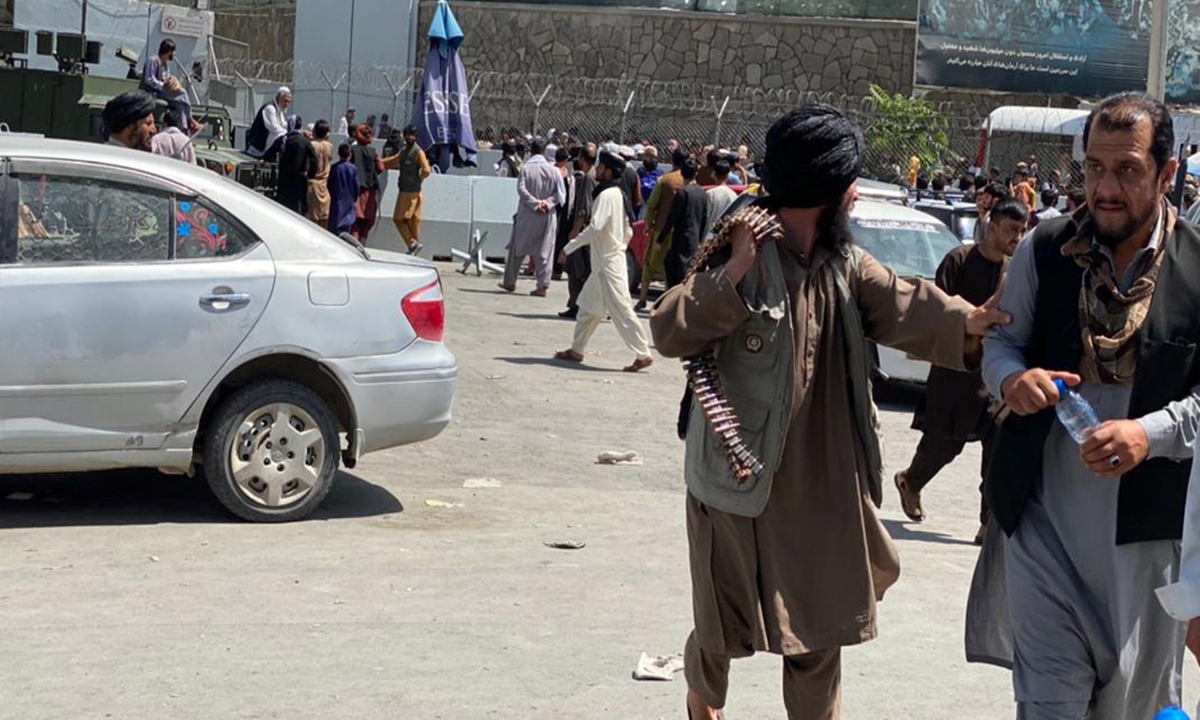
Shahrbanu said that she regularly travels between Bamyan and Kabul. "Though it seems far-fetched, I wish for the day when I might travel the Kabul-Bamiyan road without fear of getting killed," she said.
"It was a hasty decision without much concern about Afghanistan's future," she said, criticizing US' decision of irresponsibly withdrawing from Afghanistan.
She hopes China can play a significant role in Afghanistan's peace process. At Monday's press conference, China's Foreign Ministry spokesperson Hua Chunying said that on the basis of fully respecting the national sovereignty of Afghanistan and the will of various factions in the country, China has maintained contact and communication with the Afghan Taliban and played a constructive role in promoting the political settlement of the Afghan issue.
"China respects the right of the Afghan people to independently decide their own destiny and future and is ready to continue to develop good-neighborliness, friendly and cooperative relations with Afghanistan, and play a constructive role in Afghanistan's peace and reconstruction," Hua said.
Zia told the Global Times his biggest wish now is for Afghanistan to enjoy peace and stability after decades of chaos.
Five blows to the US after 20 years of war in Afghanistan
1 To its strength
The US is the most powerful country in the world. But with assembling troops from 36 countries, costing lives of thousands of Americans, and at a cost of billions of dollars in 20 years, the US did not beat Taliban. The US is like a "paper tiger" on Afghan issues.
2 To its credibility
The same scene from the "Fall of Saigon" reoccurred in Afghanistan. "Thanks to Afghanistan, the idea that Americans can't be trusted will take root deeper," said François Heisbourg, a French defense analyst.
3 To its diplomacy
Biden has been shouting "America is back" on the international stage, but the US is still conducting the "America first" policy. With the fact that the US withdrew from Afghanistan without negotiating with its allies, the US' "fake multilateralism" has been exposed.
4 To American-style democracy
American elites believed that the American democracy is the approach to prosperity and a solution to all social ills. But it did not work in Afghanistan. The Afghan government built on American democracy ceded power as the Taliban reached Kabul to seal a nationwide military victory in just ten days, becoming the biggest charade of American democracy.
5 To its arrogance
The US thought it could fix world problems and change other countries through democracy, dollars, and guns. But the Taliban's return proves again that the US could not remake any country.
On Sunday night, the Taliban forces entered the capital of Kabul and took control of the presidential palace while Afghan President, Mohammad Ashraf Ghani, left the country. This came 10 days after the Taliban launched a full-scale military offensive and less than a month before the deadline that US President Joe Biden had set for all US troops to withdraw from Afghanistan.

American soldiers wait to board helicopters at Kandahar airbase ahead of an operation in Afghanistan on 19 May, 2003. Photo: AFP
Back in July, Biden denied a Taliban takeover was "inevitable," saying that the Taliban forces of about 75,000 fighters are no match for the 300,000 Afghan security forces, CNN reported.It's reported that the Taliban have assured that all the diplomatic missions and foreign citizens in Kabul will face no danger. Meanwhile, the US has reportedly completed the evacuation of its embassy in Afghanistan.
Photos of an American helicopter evacuating people on the roof of US Embassy in Kabul was compared with a photo showing evacuees boarding a helicopter over a building in Saigon (Ho Chi Minh city) when the US was defeated in Vietnam in 1975 and the photos went viral on the social media. "This is another Saigon time for the US," some netizens said. Some said this is the "fall of Kabul" just as the "fall of Saigon" which is a shame in US history.
US Secretary of State Antony Blinken tried to defend the evacuation and told media that "Remember, this is not Saigon."
While Blinken is still trying to defend Biden's decision of withdrawing troops, for Afghans, what the US has left is a total mess drawn out over the past two decades.
Over the past 20 years, Afghanistan has been stuck in misery. The war has not only killed at least 100,000 civilians but has also left the country with difficulties in rebuilding its economy and political system.
Hujjatullah Zia, a Kabul-based columnist for Daily Outlook Afghanistan, told the Global Times on Monday that this is the defeat of the US and is a "repeat" of Vietnam for the US.
Zia is currently in Kabul and feels "a bit worried." He said he was surprised to see how quickly the Taliban took over the whole country. "[Currently in Kabul], it seems that people started a normal life but still fear is in the air," he said.
Li Weijian, vice chairman of the Chinese Association for Middle East Studies, told the Global Times on Monday that what the US gained in Afghanistan is an important lesson. The US should realize that its plan to wantonly create regimes did not suit local conditions and ultimately did not work.
"Afghanistan is just further proof that the US is retreating its tentacle in the world. Stretching its arms everywhere in the world is not sustainable. Using their own mind to control, educate, and change others could only fail," he said.
Analysts pointed out that the US has suffered five major blows: damage to American strength; to its reputation; to US diplomacy; to American democracy; and to US arrogance.
A mess for Afghanistan
On September 11, 2001, the twin tower terror attack orchestrated by the Al-Qaeda shook the US. In a bid to destroy Al-Qaeda and under the guise of bolstering local and global security, the US initiated the war in Afghanistan on October 7, 2001.
The US quickly occupied Kabul and dismantled the Taliban regime. But it did not stop its operation. Instead, it increased its troop presence in Afghanistan in 2010. At its peak, there were 100,000 American troops garrisoned in Afghanistan.
On April 14, Biden announced the withdrawal of all American troops from Afghanistan before September 11, along with NATO troops. He said that the US has completed the goal of counter-terrorism.
However, both Afghan and Chinese experts reached by the Global Times noted that the "war on terrorism" that the US declared is a failure.
Back in the US, many people also saw it as a lost war. More than 20,000 US soldiers and officers were wounded in Afghanistan, and 2,300 were killed. More than $2.26 trillion was spent, according to media reports.
But for Afghan people, the price is even heavier. Zhu Yongbiao from the Center for Afghanistan Studies in Lanzhou University told the Global Times in a previous interview that about half of all civilian casualties in Afghanistan in the past 20 years were directly related to the US troops. The war also led to 2 million people becoming refugees and caused huge losses to property.

Residents from northern provinces of Afghanistan who fled from their homes due to the fighting between Taliban and Afghan security forces, take shelter in a public park in Kabul on Saturday. Photo: IC
Economically, Afghanistan is still suffering from poverty and economic decline, Zia said.
Analysts pointed out that while the US once promised to rebuild Afghanistan, its promise was substantially frustrated.
Zhao Minghao, a senior fellow at the Institute of International Studies for American Studies at Fudan University and a researcher at the Center for International Security and Strategy at Tsinghua University (CISS), analyzed why US "nation building" plan in Afghanistan failed.
Based on the investigation of the relevant policies and their implementation during the Bush and Obama administrations respectively, it can be concluded that the "nation-building" carried out by the US in Afghanistan lacks feasible goals and coherent, clear strategies. Many policies are contradictory, resource channeling is incredibly insufficient, and there are many problems in policy implementation, and institutional coordination, Zhao analyzed in an article on the CISS website.
In terms of the security reconstruction of Afghanistan by the US, it was dominated by "anti-terrorism" and "counter-insurgency" military operations, which weakens the sense of security of the Afghan society and ordinary people as a whole. As for the political reconstruction, the US, despite the opposition of the Northern Alliance and other nations, implemented the presidential system in Afghanistan, which was not compatible with the political tradition and culture of Afghanistan, he wrote.
According to Zhao, US aid bypassing Afghanistan's central government has led to the emergence of a "parallel government" that undermines the central government's authority. In terms of economic reconstruction, there is a serious lack of development support for agriculture and rural areas, making it difficult to effectively deal with the drug economy. Besides, the US overestimates Afghanistan's integration with Central Asian countries and lacks the resources input to promote regional economic development.
Li told the Global Times that the real aim of the US entering Afghanistan was to build an America-model regime under its control.
"The US built up a government in Afghanistan that largely relies on the US, but it never solved the problem of ethnic solidarity in Afghanistan," he said.
Li noted that the Taliban issue after all is an issue of ethnic contradictions. "When the Taliban members put down their arms, they are civilians in remote mountains; they could fight any time when they need to."
On military, though the US helps build a large army of around 300,000 people costing $88 billion to Afghanistan, the army could not act independently. "When the US army withdrew from Afghanistan, the psychological defense of local government's troops was also destroyed," Li said.
Analyst said that because of the "self-interest" of the US, what is left is a split and chaotic society in Afghanistan.
What's ahead?
The US disappointed the Afghan people and ruined their faith in democracy, human rights, and civil rights, Dr. Latif Pedram, leader of the National Congress Party (NCP) of Afghanistan and former Member of Parliament, told the Global Times in an interview.
"The faces of American imperialism, and postmodern-colonialism, hidden beneath American democracy and human rights, were revealed. People's frustration with what is called American democracy and human rights is another part of American legacy in Afghanistan."

People gather outside the Hamid Karzai International Airport, to flee Afghanistan on Monday. Photo: IC
An Afghan woman named Shahrbanu told the Global Times that she once had long-term plans for herself, including staying in the country and working. But since the Americans announced their departure, she was no longer sure whether she could continue working there.Shahrbanu said that she regularly travels between Bamyan and Kabul. "Though it seems far-fetched, I wish for the day when I might travel the Kabul-Bamiyan road without fear of getting killed," she said.
"It was a hasty decision without much concern about Afghanistan's future," she said, criticizing US' decision of irresponsibly withdrawing from Afghanistan.
She hopes China can play a significant role in Afghanistan's peace process. At Monday's press conference, China's Foreign Ministry spokesperson Hua Chunying said that on the basis of fully respecting the national sovereignty of Afghanistan and the will of various factions in the country, China has maintained contact and communication with the Afghan Taliban and played a constructive role in promoting the political settlement of the Afghan issue.
"China respects the right of the Afghan people to independently decide their own destiny and future and is ready to continue to develop good-neighborliness, friendly and cooperative relations with Afghanistan, and play a constructive role in Afghanistan's peace and reconstruction," Hua said.
Zia told the Global Times his biggest wish now is for Afghanistan to enjoy peace and stability after decades of chaos.
Five blows to the US after 20 years of war in Afghanistan
1 To its strength
The US is the most powerful country in the world. But with assembling troops from 36 countries, costing lives of thousands of Americans, and at a cost of billions of dollars in 20 years, the US did not beat Taliban. The US is like a "paper tiger" on Afghan issues.
2 To its credibility
The same scene from the "Fall of Saigon" reoccurred in Afghanistan. "Thanks to Afghanistan, the idea that Americans can't be trusted will take root deeper," said François Heisbourg, a French defense analyst.
3 To its diplomacy
Biden has been shouting "America is back" on the international stage, but the US is still conducting the "America first" policy. With the fact that the US withdrew from Afghanistan without negotiating with its allies, the US' "fake multilateralism" has been exposed.
4 To American-style democracy
American elites believed that the American democracy is the approach to prosperity and a solution to all social ills. But it did not work in Afghanistan. The Afghan government built on American democracy ceded power as the Taliban reached Kabul to seal a nationwide military victory in just ten days, becoming the biggest charade of American democracy.
5 To its arrogance
The US thought it could fix world problems and change other countries through democracy, dollars, and guns. But the Taliban's return proves again that the US could not remake any country.

